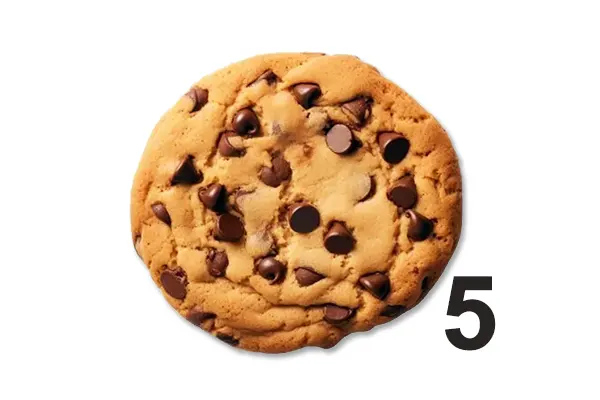Well, this saga turned out to be a bust. In the final chapter, Chrome’s third-party cookie will remain completely intact, ruining everyone’s favourite graphic and verbal analogy. Yes, the Google cookie un-crumbles.
We didn’t bother covering Google’s last two cookie-deprecation delays. Let’s close off this long thread, shall we?
“Google to keep cookies—what the major reversal means for advertisers”
— Advertising Age, Jul 22, 2024 [1]
Behind the Headline: Recall from previous posts here, Goggle first proposed deprecating third-party cookies in 2020 because of growing privacy and antitrust concerns by regulators. Google has been trying to walk the fine line of keeping regulators and its major competitor/partner Apple happy, while maintaining its position of world dominance in search.
Google created the Privacy Sandbox to replace third-party cookies’ ability to target consumers with online advertising—more privately. It’s a set of web guidelines for the marketing and publishing industries to share, but Google controls the technology behind it. For four years, Google has been developing Privacy Sandbox to prove it’s as effective for online advertising as third-party cookies. Though Google’s own comparative ROI analysis has been very positive, others have not been able to replicate this. So there has been no industry-wide embracing of Privacy Sandbox.
Surprisingly (or not), regulators began to have both privacy concerns with Privacy Sandbox and a particular API that is part of it called Topics API. Recent research showed that analysing as few as three website topic categories provided by the Topics API can ‘fingerprint’s a user for future re-identification [2]. So much for anonymising consumers.
Over the last few months, the UK’s antitrust regulator and data privacy regulator has been critical of Privacy Sandbox. This was likely the last straw for Google.
The Way Forward for Google
- Chrome will still capture third-party cookie data, but users had the ability to exclude themselves. The vast majority of competitive web browsers have already dropped third-party cookies.
- Google claims it will continue to develop Privacy Sandbox. Presumably not for online ad targeting purposes.
- Google has maintained its search partnership with Apple.
- Gen AI will be Google’s next big battlefront, one where it doesn’t have any dominance.
The Way Forward for Marketers
- The online ad ecosystem has not been dependent on third-party cookies for a few years now, so this whole story has become a bit of a non-event.
- There remains a huge issue with the effectiveness of online advertising that predates the crumbling cookie story, discussed previously here: MARKETING’S FAKE NEWS. Focus on that.
- Develop your own data strategy with a focus on first-person data—your own customers and prospects.
- Experiment wisely with third-party data and new ad media options. Pay attention to those old-school concepts of creative quality and media environment.
And while we were procrastinating on writing this final chapter…
“WASHINGTON, Aug 5—A U.S. judge ruled on Monday that Google violated antitrust law, spending billions of dollars to create an illegal monopoly and become the world’s default search engine, the first big win for federal authorities taking on Big Tech’s market dominance.”
— Reuters [3]
Behind the Headline: This event is a ruling in an antitrust trial that started last fall, but was the result of the Oct 20, 2020, antitrust suit filed by the US Department of Justice—which started the entire cookie deprecation debacle. So that took almost four years.
The Land of Opportunity has a strange relationship with capitalistic success: Pursue the American Dream but don’t become the best and then so big that you get labelled a monopoly.
Antitrust laws were enacted to combat the railroad monopolies of the 1800s. Think JP Morgan (the man). The first private enterprises that built the railroad network across America took big risks and spent massive amounts of capital over a long period of time. The same is true of Google, starting just 25 years ago.
Big networks need scale to develop and run efficiently.
We believe a case can be made for regulating a monopoly’s pricing, but not for breaking it up into less efficient and less effective parts.
The August 5th event is just a ruling. The next step is a ‘remedy trial’ to determine what Google must do. The ruling will certainly be appealed by Google, and the remedy may be as well. Legal wrangling will likely carry on into 2026 [3]. This is the big legal/big tech/business story that will replace marketing’s little cookie deprecation thread.
For Google, every year of legal wrangling means at least US$300bn in annual revenue from search [4]. But Google really is the best search engine and the massive first-person data it collects makes Google Search the most effective consumer targeting medium. Its weakness is creative format. Programmatic online advertising has better creative format options but, as discussed in MARKETING’S FAKE NEWS, relies on often questionable third-party data (like browser cookies). Please re-read The Way Forward for Marketers, above.
- Garett Sloane, “Google to keep cookies—what the major reversal means for advertisers“, adage.com, Jul 22, 2024.
- Stephanie Liu & Mo Allibhai, “Google Finally Scraps Its Cookie Deprecation Plans“, forrester.com, Jul 22, 2024..
- Link to Reuters press release of Aug 5, 2024.
- Statista’s estimate of Google’s 2023 annual revenue from search. Statista’s estimates are not always accurate but they are usually in the ballpark.





